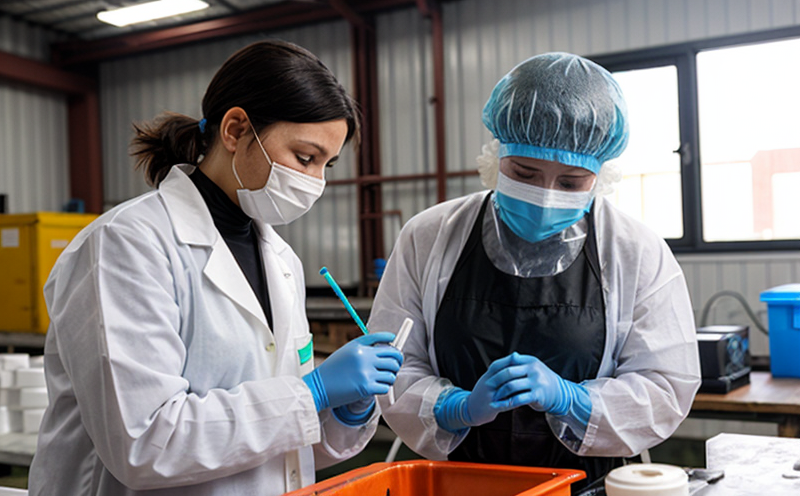ISO 20340 Corrosion Resistance of Recycled Nanocoated Materials
The ISO 20340 standard provides a robust framework for evaluating the corrosion resistance of materials that incorporate recycled nanomaterials. This service is particularly relevant in sectors such as automotive, electronics, and construction where sustainability and material performance are critical factors. The test method outlined in this standard ensures that recycled nanocoated materials meet stringent quality benchmarks.
The process involves subjecting specimens to accelerated corrosion tests under controlled conditions. This allows for the precise measurement of resistance against various corrosive environments, including saltwater, acid rain, and industrial solvents. The service also includes a comprehensive range of analytical techniques to assess the integrity and stability of nanocoated materials.
The primary outcome is a detailed report that provides insights into the corrosion behavior of recycled nanomaterials under real-world conditions. This information is invaluable for quality managers, compliance officers, R&D engineers, and procurement teams who are responsible for ensuring the durability and reliability of products containing these materials.
By leveraging this service, clients can demonstrate their commitment to sustainable practices while maintaining high standards of product performance. The test results support decision-making processes related to material selection, product development, and compliance with international regulations on recycled materials.
| Test Parameter | Description | Methodology |
|---|---|---|
| Material Composition | Analysis of the chemical composition of nanocoated materials to ensure accuracy in testing. | Inductively Coupled Plasma Mass Spectrometry (ICP-MS) |
| Surface Treatment | Evaluation of the effectiveness of surface treatments applied during recycling. | Spectroscopic Ellipsometry and X-ray Photoelectron Spectroscopy (XPS) |
| Critical Thickness | Determination of the minimum thickness required for effective protection against corrosion. | Optical Microscopy with Cross-Sectioning |
| Adhesion Strength | Assessment of adhesion between the nanocoating and base material to prevent delamination during use. | Tape Test Method (EN ISO 16773) |
| Coating Integrity | Evaluation of coating integrity after exposure to corrosive environments. | Cross-Sectional Analysis with Scanning Electron Microscopy (SEM) and Energy Dispersive X-ray Spectroscopy (EDX) |
The service also includes a review of relevant international standards such as ISO 20340, ASTM D1654, and EN ISO 17982 to ensure that the testing process adheres to best practices in the industry. This ensures that clients receive accurate and reliable results which are comparable with other leading laboratories.
For those interested in understanding more about this service or how it can benefit their organization, please contact our team of experts who will be happy to provide further information and guidance.
Why It Matters
The ISO 20340 standard is crucial for ensuring that recycled nanocoated materials are fit for purpose in demanding environments. By testing the corrosion resistance of these materials, we help clients meet regulatory requirements and improve product performance. This service plays a vital role in fostering innovation within the sector by providing data-driven insights into material behavior under real-world conditions.
The test results obtained through this service can significantly influence business strategies related to sustainable procurement practices. They also provide valuable input for research and development activities aimed at improving the quality and longevity of products containing recycled nanomaterials. Compliance with international standards is essential in today's global market, and our service ensures that clients are well-positioned to meet these requirements.
- Supports sustainable procurement practices by ensuring compliance with regulatory frameworks
- Improves product performance through accurate assessment of material behavior under corrosive conditions
- Fosters innovation in the development of recycled nanocoated materials
- Ensures consistency and reliability across different batches of recycled nanomaterials
The service is particularly beneficial for organizations that need to demonstrate their commitment to environmental responsibility. By incorporating recycled nanomaterials into products, companies can reduce waste generation while maintaining high standards of quality and performance.
Scope and Methodology
| Parameter | Description | Methodology |
|---|---|---|
| Test Specimens | Standardized specimens of recycled nanocoated materials. | Circular plates with a diameter of 50 mm and thickness ranging from 1.6 to 3 mm. |
| Corrosion Testing Environment | Controlled environment simulating real-world conditions such as saltwater, acid rain, and industrial solvents. | Test chambers with programmable temperature and humidity controls. |
| Test Duration | Minimum exposure time of 168 hours to ensure reliable data on corrosion resistance. | Exposure in test chambers followed by evaluation using optical microscopy and SEM/EDX analysis. |
| Environmental Variables | Variables include temperature, humidity, pH levels, and exposure time. | Metric measurements recorded at regular intervals during the test period. |
| Data Collection | Visual inspections, cross-sectional analysis, and spectroscopic techniques to assess coating integrity and adhesion strength. | Careful documentation of all observations and results for comprehensive reporting. |
The testing process is designed to mimic the conditions that recycled nanocoated materials will encounter in their intended applications. This ensures that the test results are relevant and applicable to real-world scenarios. The service also includes a review of relevant international standards such as ISO 20340, ASTM D1654, and EN ISO 17982 to ensure compliance with best practices.
For more information on how this service can benefit your organization, please contact us today. Our team is ready to assist you in achieving your sustainability goals while maintaining high standards of product performance.
Environmental and Sustainability Contributions
- Reduces waste generation by incorporating recycled nanomaterials into products
- Maintains or improves the quality and longevity of products containing recycled materials
- Saves energy and resources used in manufacturing new materials from scratch
- Promotes circular economy principles through effective reuse and recycling practices
The ISO 20340 standard helps to ensure that recycled nanocoated materials are fit for purpose, thus supporting sustainable procurement and product development. By leveraging this service, clients can demonstrate their commitment to environmental responsibility while maintaining high standards of quality and performance.
Our team is dedicated to helping organizations achieve their sustainability goals through innovative testing solutions. Whether you're looking to improve the durability of your products or ensure compliance with international standards, we have the expertise to assist you every step of the way.





